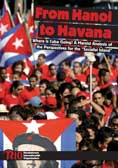




 Cuba has never been a socialist society in which the working class manages the means of production democratically. Cuba has never seen any kid of proletarian democracy: no kind of workers’ and peasants’ councils with elected and recallable delegates, similar to the Soviet system established by the October Revolution in Russia and subsequently crushed by the Stalinist counterrevolution of the 1920s/30s. The Cuban bureaucracy had no need to carry out a political counterrevolution to crush organs of proletarian democracy because such organs simply did not exist: from the beginning it based itself on the Bonapartist state apparatus established before the expropriation of the bourgeoisie. “Castro, who in 1959 was a bonaparte for the enfeebled Cuban bourgeoisie was, by 1962, a bonaparte “for” the politically expropriated Cuban working class.”[12]
Cuba has never been a socialist society in which the working class manages the means of production democratically. Cuba has never seen any kid of proletarian democracy: no kind of workers’ and peasants’ councils with elected and recallable delegates, similar to the Soviet system established by the October Revolution in Russia and subsequently crushed by the Stalinist counterrevolution of the 1920s/30s. The Cuban bureaucracy had no need to carry out a political counterrevolution to crush organs of proletarian democracy because such organs simply did not exist: from the beginning it based itself on the Bonapartist state apparatus established before the expropriation of the bourgeoisie. “Castro, who in 1959 was a bonaparte for the enfeebled Cuban bourgeoisie was, by 1962, a bonaparte “for” the politically expropriated Cuban working class.”[12]
The Cuban regime, in comparison with the rest of the “socialist block”, has never been particularly repressive towards its population – there have never been any tanks out on the streets to crush a people’s uprising like in Czechoslovakia in 1968 or in Poland in 1981, and there was never an extensive system of gulags like in Stalin’s Soviet Union. The Castro brothers enjoy legitimacy in the eyes of large sectors of the population compared to other Stalinist leaders due to their role in the independence struggle. However, the system’s essentially Stalinist basis became clear recently when two important politicians from the “young generation”, Felipe Pérez Roque and Carlos Lage, were removed from all leadership positions – unexpectedly, with no previous discussion in the party[13].
An even more dramatic example was the case of Esteban Morales, a researcher from the Center for Hemispheric and US Studies at the University of Havana and a regular contributor to official Cuban newspapers and TV shows. In an article published in April 2010 on the web site of the Union of Writers and Artists of Cuba (UNEAC), he asked if corruption was “the true counterrevolution”. He wrote: “When we closely observe Cuba’s internal situation today, we can have no doubt that the counter-revolution, little by little, is taking positions at certain levels of the State and Government (…) Without a doubt, it is becoming evident that there are people in positions of government and state who are girding themselves financially for when the Revolution falls, and others may have everything almost ready to transfer state-owned assets to private hands, as happened in the old USSR.”[14] Despite the fact that Morales did not attack the bureaucracy itself, limiting his criticism to only the most corrupt elements within it, he was expelled from the Communist Party and barred from expressing himself in the media. This example shows how little hope exists for the Cuban bureaucracy to reform itself in the direction of socialism.
Just like in the days of the guerilla, the Cuban leadership to this day has a great deal of autonomy from the population and even from its own party and state structures. A recent example of this is the “Group for Support of the Commander”, which was Fidel’s private political party totally outside the structures of the PCC. (This is a minor version of China under Mao where the Maoist leadership, also the product of a peasant-based guerilla war, could maneuver relatively autonomously from other parts of the ruling bureaucracy.)[15]
Formally democratic institutions such as the “Assembly of People’s Power”, modeled after a bourgeois parliament, were only created with the constitution of 1976, i.e. more than 15 years after the revolution! There are assemblies to pick candidates to this parliament which integrate a large part of the population. However, in these assemblies there are no campaigns, no political programs and above all no political parties or organizations (even the PCC is not allowed to campaign). Studies show that a majority of Cubans select these candidates based on criteria like “honesty” – unfortunately, “honest” people can support the restoration of capitalism. In this framework, the Communist Party maintains its unofficial hegemony: 70% of the candidates are PCC members, even though they represent only 15% of the electorate[16].
Notes
12. Workers Power: Degenerate Revolution. P. 87.
13. Ian Urbina: “In Cuba, Change Means More of the Same, With Control at the Top”. In: New York Times. April 6, 2009.
14. Eduardo Molina: “¿Qué se negocia en La Habana?”. German: “Worüber wird in Havanna verhandelt?”.) See also: Bill Van Auken: “Cuba’s Raúl Castro unveils plan for massive job cuts.”
15. For a discussion of this, see: Roberto Ramirez: “Cuba frente a una encrucijada”. In: Socialismo o Barbarie. #22. P. 97-102.
16. Haroldo Dilla Alfonso/Gerardo González Núnez: “Successes and Failures of a Decentralizing Experience. Cuba’s Local Governments”. In: Brenner: Cuba Reader. P. 81-83.
Leave a Reply
